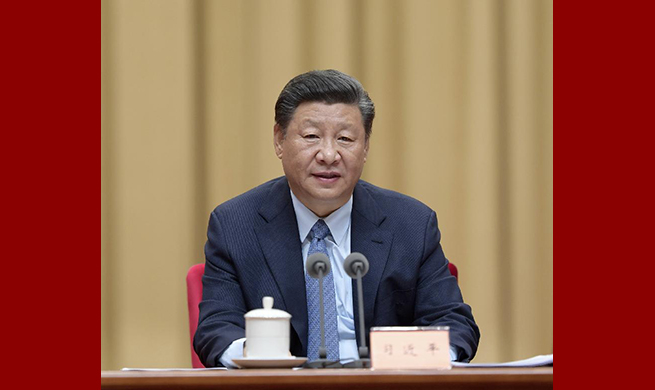NEW YORK, Sept. 28 (Xinhua) -- Opportunities to go studying in China have increased for American students of all ages, which is essential to bolstering their Chinese language proficiency and cultivating better career skills, said an American professor at the University of Virginia (UVA).
Learning Chinese could be a great help for students who wanted to become journalists, doctors, diplomats and scientists, and do many other careers, said Charles A. Laughlin, chair of the Department of East Asian Languages, Literatures and Cultures at the UVA.
In addition to students of East Asian studies and Chinese culture and literature, many more students who are studying Chinese language at the UVA are majoring in politics, international relations, religion, history, environmental protection and other fields, the professor said.
"In the past, like in my generation, you would only visit China, maybe as a college student, or as a graduate student," Laughlin told Xinhua in a recent interview.
"But now high school students can spend a year in China and even younger students can spend a summer in China. And these experiences are crucial to cementing the sort of resolution to go on and learn Chinese and become really fluent and proficient," he said.
The number of Americans studying in China increased by over 500 percent to nearly 9,000 in the decade from 1995/1996 to 2005/2006, making China one of the top 10 study abroad destination countries for U.S. students, according to a 2008 report by the Institute of International Education (IIE), a U.S. nonprofit organization. Now, the number of American students in China stands at about 12,000 a year, statistics showed.
Studying abroad offers students a competitive advantage and cross-cultural competence that open up a world of career opportunities, according to a 2015 book titled "A Student Guide to Study Abroad," published by the IIE and the American Institute For Foreign Study.
"Every student who wants to succeed in the global economy should study abroad. It is one of the most valuable things you can do for yourself and your career," the book said.
LASTING POPULARITY OF LEARNING CHINESE
"I think learning Chinese is at a kind of peak of popularity right now, but it's been at a peak for a long time," Laughlin said.
He said Chinese used to belong to a category of foreign language learning, which is called "less commonly taught languages" -- the languages that most students were not learning.
However, because of the rise of China economically and politically since the early 1990s, more and more American students feel like they might be able to use the Chinese language ability to do different careers in journalism, law, diplomacy, as well as academic fields. So they become very interested in learning, the professor said.
Current figures reveal that more than 400,000 students are studying Mandarin in the United States. The U.S.-China Strong Foundation said it aims to expand to 1 million the number of U.S. K-12 students learning Mandarin by 2020.
"We have this sort of vast increase in the number of students taking Chinese, which was very exciting for us," said Laughlin, adding that the United States is also a great place for the teaching of Chinese, because many teachers from all over the world are coming to exchange ideas about how to teach Chinese best.
Having studied in China himself as a college student, first for a summer program and then a year at Nankai University in Tianjin, Laughlin said he believes "a substantial study abroad experience is absolutely essential to learning any foreign language well, and Chinese is included."
He said the UVA has a summer program for its students to study at East China Normal University in Shanghai, which has been going for 15 or 16 years.
"It's not large, but I think if you look at our Chinese and East Asian studies majors, the students in our department, pretty much all of them who are learning Chinese go to that program sooner or later," said Laughlin.
"The main thing is to get students out there and as long as possible," he said. "We're applying for U.S. government funding to create a flagship program, which would allow students who participate in this program to spend one summer plus one year at two different occasions, pretty much the same as I did by myself in an intensive Chinese language program."
LEARNING CHINESE AT YOUNGER AGE
At the high school level, there are nationwide programs in the United States such as "School Year Abroad (SYA)" which sponsors students to study in a Chinese high school for a year and get academic credits, he said.
Under the SYA program, American high school students would learn academic subjects like history, math and geography in Chinese at a Beijing high school. "It sounds almost impossibly difficult, but it's a very successful program. And these students that came out of this program would have very strong Chinese language skills coming into college," Laughlin explained.
The number of U.S. programs for students to study in China doubled from about 100 in 2001/2002 to 220 in 2008/2009 period, according to the IIE report.
In addition to American institutes-sponsored programs, Confucius Institute has also helped to bring Chinese language instruction beyond the university to middle schools and elementary schools, he said.
"They've also brought it to universities and colleges that did not have Chinese language learning before. So they contributed considerably to the increase in enrollments in Chinese language classes, and therefore, no doubt, have increased the number of Americans who are interested in going to China and developing careers that are connected with China," he added.
The United States has seen the fever for learning Mandarin moving to an even younger age recently.
China Institute, the oldest bicultural non-profit organization in the United States focusing on advancing a deeper understanding of China, has just announced this week that it will launch its Mandarin full immersion preschool next fall in New York for students as young as two and a half years old.
"It's a trend that learning Chinese has gone younger and younger. For the past 10 to 15 years, we've seen a surge of learning Chinese in the K-12 school system," said Shenzhan Liao, head of the School of Chinese Studies of China Institute.
"Now it really is going towards the younger age. It is tremendously in need for preschool Mandarin education particularly in the financial district we're located," she added. "Many parents are very interested in sending their kids to learn a different language and culture."













